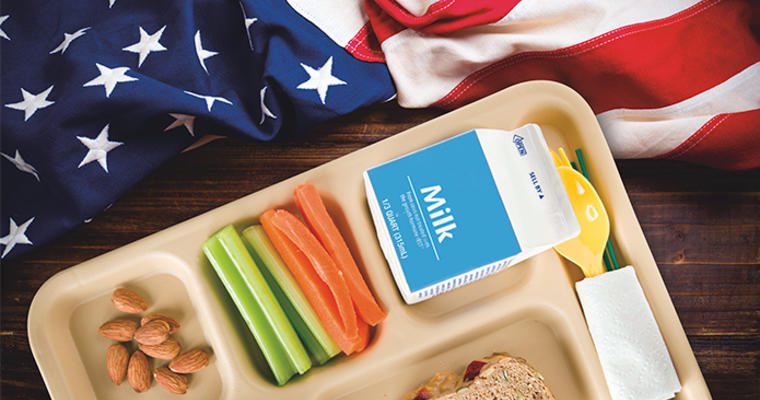The Buy American Provision is an important aspect of the National School Lunch Program. Over the past year or so it has been a hot topic for schools, as more and more schools have noticed a Buy American emphasis on administrative reviews. It’s a topic that’s not going away, so foodservice directors should make it a consistent focus.
Know your definitions
If you’re not familiar with the definition and details of the regulation, here’s a primer:
Commodities and foods that support the Buy American provision must be substantially produced and processed within the United States. “Substantial” is defined as “over 51% of the final processed product consists of agricultural commodities that were grown domestically.” Schools need to consider how this affects processed and unprocessed foods:
- Unprocessed foods or agricultural commodities must be domestic.
- Processed foods must be processed in the United States using domestic ingredients and result in over 51 percent domestic content, by weight or volume.
Remember: You’re responsible
Many school programs may receive products from a contract management group or use a Group Purchasing Organization (GPO) to aid in their item selection. In those cases, regardless of who is purchasing the food, compliance with the Buy American Provision remains the responsibility of the School Foodservice Authority (SFA).
Just because a product is made by a well-known U.S. brand does not mean it will meet the Buy American Provision. Similarly, just because an item is carried by a U.S. foodservice distributor, it’s not guaranteed to be compliant.
Are There Exceptions?
There are two instances when adherence to the Buy American Provision does not need to be maintained, but such occurrences are rare. These exceptions are based on availability and cost. The USDA defines them as follows:
Product availability: “The product is not produced or manufactured in the U.S. in sufficient and reasonably available quantities of a satisfactory quality.”
Product cost: “Competitive bids reveal the cost of a U.S. product is significantly higher than the foreign product.”
Furthermore, before considering an exception, the SFA should explore alternative products or items that are domestically sourced or meet the Buy American Provision. The USDA notes several questions in a recent memo, including these considerations, which should be taken before utilizing an exception:
- “Are there other domestic sources for this product?”
- “Is there a domestic product that could be easily substituted, if the non-domestic product is less expensive?”
- “Am I soliciting bids for this product at the best time of year? If I contracted earlier or later in the season, would prices and/or availability change?”
Schools that choose to execute an exception must provide documentation supporting their decision. It is not necessary to request a formal waiver when using an exception, but the documentation is important and should clearly justify the decision.
Best bid practices for adherence
Work with your foodservice distributor and manufacturers to understand the items you’re purchasing and menuing. Build your bid specifications to eliminate non-domestic products or include alternate domestic items.
Alternate domestic items specified in your bid will allow for cost evaluations to support a “Product Cost” exception and ensure pricing is in place for substitute items, explains Jon Fillmore, Gordon Food Service Senior Business Analyst. Understand the best time of year to complete your bid and work that into your calendar. Specify your adherence to the Buy American Provision and consider including a statement emphasizing that products must be substantially produced and processed within the United States.
Compliance and the administrative review
The process of checking compliance to the Buy American Provision during an administrative review may not always be the same, but generally, be prepared to show your bid and how you accounted for the requirements in the contract. Additionally, the reviewer may look at invoices and audit randomly selected products in your freezer, dry storage or refrigerator. Upon review, if products that are not domestic are identified then documentation that warrants the rare exception will be requested. The more you work with your foodservice staff, distributors and manufacturers, the more likely you will be to have a positive review experience.
Be proactive
Here are a few tips to make sure your SFA is properly monitoring Buy American compliance:
- Audit invoices, receipts or stocked products.
- Conduct random audits of storage areas, including freezer and dry storage, to identify domestic and non-domestic products.
- Review any products that are not domestic and make sure you ask detailed questions to explore alternatives. If no alternatives are identified, then ensure documentation is on file to support the exception.
Use your resources to help you with the process. Gordon Food Service added a Buy American filter to Online Ordering recently. Use this filter when reviewing your order guide or when viewing the product catalog for new products.











